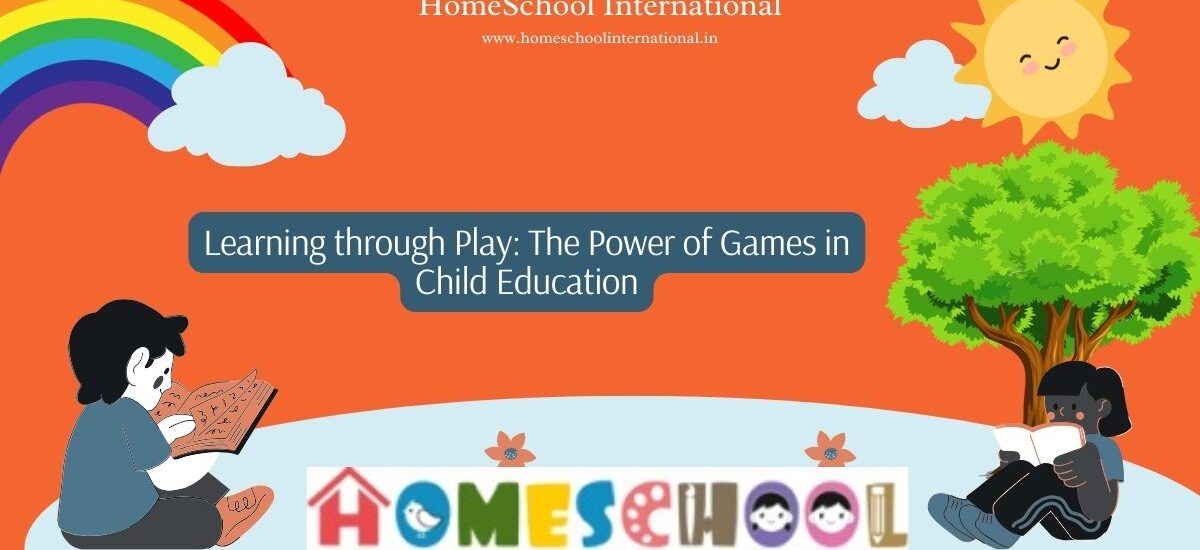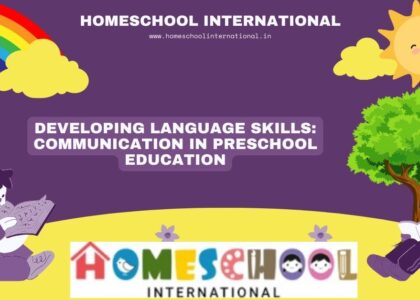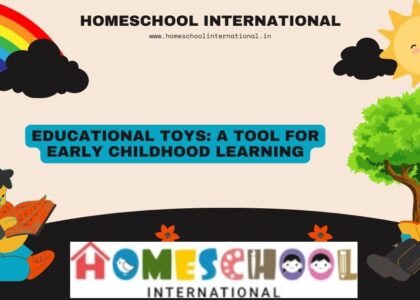Learning through Play: The Power of Games in Child Education- In the colorful landscape of child education, one of the most potent tools for fostering learning is often found in the simplest of activities: play. “Power of Games in Child Education” encapsulates the transformative influence that games wield in shaping young minds. Welcome to our exploration of “Learning through Play: The Power of Games in Child Education.” At Homeschool International, we recognize the profound impact that games have on children’s cognitive, social, and emotional development. In this blog post, we delve into the dynamic world of game-based learning, uncovering the myriad benefits it offers to young learners. Join us as we embark on a journey to unleash the potential of play in nurturing curious minds and fostering lifelong learning.
Also Check: Nurturing Curiosity: Science and Exploration in Preschools
Understanding Learning Through Play
- Defining Learning Through Play:
- Clarify the concept of learning through play as a dynamic process wherein children engage in activities that promote exploration, experimentation, and discovery.
- Emphasize the intrinsic value of play in stimulating children’s curiosity, creativity, and problem-solving skills.
- The Role of Games in Child Education:
- Discuss the pivotal role that games play in facilitating learning experiences for children.
- Explore how games provide opportunities for children to apply academic concepts, develop critical thinking skills, and engage in collaborative problem-solving.
- Integration of Play and Educational Goals:
- Highlight the intersection between play and educational goals, emphasizing the complementary nature of games and traditional learning approaches.
- Discuss how games can enhance children’s motivation, engagement, and retention of academic content.
By structuring the content with clear headings and incorporating relevant keywords, this section not only enhances readability but also improves search engine visibility for the topic of learning through play and the role of games in child education.
Cognitive Benefits of Games in Child Education
- Enhancing Critical Thinking Skills:
- Explore how games stimulate children’s critical thinking abilities by presenting challenges, puzzles, and decision-making scenarios.
- Discuss the cognitive processes involved in analyzing information, formulating strategies, and evaluating outcomes during gameplay.
- Improving Memory and Attention:
- Highlight the memory-boosting effects of games, which require children to recall rules, sequences, and patterns.
- Discuss how games also promote sustained attention and concentration as children focus on achieving objectives and overcoming obstacles.
- Developing Executive Functioning Skills:
- Examine how games support the development of executive functioning skills, such as planning, organization, and self-regulation.
- Discuss the role of games in helping children manage time, set goals, and adapt strategies based on feedback and feedback.
By structuring the content with clear headings and incorporating relevant keywords, this section not only enhances readability but also improves search engine visibility for the topic of cognitive benefits of games in child education.
Also Check: The Role of Technology in Early Childhood Education
Social and Emotional Development Through Games
- Fostering Collaboration and Communication:
- Discuss how games provide opportunities for children to collaborate with peers, communicate ideas, and work towards common goals.
- Highlight the importance of teamwork, negotiation, and effective communication skills in multiplayer games.
- Building Empathy and Perspective-Taking:
- Explore how games promote empathy and perspective-taking as children step into the shoes of different characters or navigate complex social interactions.
- Discuss the role of narrative-driven games in fostering empathy and promoting understanding of diverse experiences and perspectives.
- Encouraging Emotional Regulation:
- Examine how games help children develop emotional regulation skills by providing a safe space to experience and manage emotions.
- Discuss the potential therapeutic benefits of games in helping children cope with stress, anxiety, and challenging emotions.
By structuring the content with clear headings and incorporating relevant keywords, this section not only enhances readability but also improves search engine visibility for the topic of social and emotional development through games in child education.
Integrating Games Into Educational Practices
- Selecting Educational Games:
- Provide guidance on selecting educational games that align with learning objectives, curriculum standards, and children’s interests and abilities.
- Discuss the importance of choosing games that offer age-appropriate content, clear learning goals, and engaging gameplay mechanics.
- Incorporating Games Into Lesson Plans:
- Explore strategies for integrating games into lesson plans and classroom activities to reinforce academic concepts and skills.
- Discuss how educators can use games as interactive learning tools to enhance student engagement, motivation, and comprehension.
- Adapting Games for Diverse Learners:
- Advocate for adapting games to meet the needs of diverse learners, including students with different learning styles, abilities, and preferences.
- Discuss how educators can modify game rules, difficulty levels, and scaffolding techniques to provide tailored learning experiences for all students.
By structuring the content with clear headings and incorporating relevant keywords, this section not only enhances readability but also improves search engine visibility for the topic of integrating games into educational practices for child education.
Also Check: Childhood Adventures: Outdoor Activities in Preschools
Empowering Parents and Educators Through Game-Based Learning
- Providing Resources for Parents:
- Offer parents guidance on selecting and incorporating educational games into home learning environments.
- Provide recommendations for age-appropriate games, online resources, and interactive platforms that support game-based learning.
- Educational Workshops and Training:
- Advocate for educational workshops and training sessions to empower educators with knowledge and skills in implementing game-based learning strategies.
- Discuss the benefits of professional development opportunities in enhancing educators’ confidence, competence, and creativity in using games for instruction.
- Fostering Collaboration Between Home and School:
- Highlight the importance of collaboration between parents and educators in supporting children’s learning through games.
- Encourage open communication, shared goals, and mutual support between home and school environments to maximize the impact of game-based learning.
By structuring the content with clear headings and incorporating relevant keywords, this section not only enhances readability but also improves search engine visibility for the topic of empowering parents and educators through game-based learning in child education.
Conclusion: Learning through Play- The Power of Games in Child Education
- Reflecting on the Transformative Power of Play:
- Take a moment to reflect on the transformative impact of game-based learning in child education.
- Highlight the multifaceted benefits of play in fostering cognitive, social, and emotional development in young learners.
- Embracing the Joy of Learning:
- Reaffirm the importance of embracing play as a joyful and effective tool for nurturing curious minds and fostering lifelong learners.
- Encourage parents, educators, and stakeholders to prioritize play-based approaches that ignite children’s passion for learning.
- Continuing the Journey of Exploration:
- Emphasize the ongoing nature of the journey towards unlocking the full potential of play in child education.
- Encourage readers to explore new ideas, strategies, and resources for integrating game-based learning into their educational practices.
- Gratitude and Commitment:
- Express gratitude to all parents, educators, researchers, and advocates who champion the power of games in child education.
- Commit to fostering a culture that values play, creativity, and innovation in shaping the future of education.











